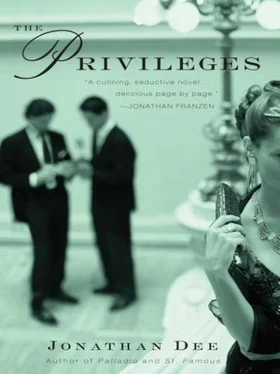It was particularly hard to watch when they would change the sheets in her father’s bed with him still in it, the gentle but practiced way they rolled the wisp of his body from side to side, the passivity outside the reach of shame with which he submitted to it. He was similarly receptive to being shaved, though it was easier for Cynthia to understand the sensual appeal involved there. Knowing him, he’d probably splurged on the occasional professional shave back in the day. She wished she could do it for him, but there was no way she could trust herself to stay calm enough; shaving someone’s face with a razor would have been nerve-racking even under better circumstances. When watching this kind of upkeep got to be too much for her, she stood out on the veranda and stared at the artificial lake. It was easier to look at somehow when the birds were around; they didn’t seem on any kind of schedule, though. Irene didn’t join her out there, because Cynthia had told her she was allergic to cigarette smoke — a lie Irene likely recognized, but there were moments when Cynthia found she just couldn’t bear anyone’s company.
She would have brought him anything at all to eat, and they encouraged her to do that, within certain limits; his systems were closing down, and so anything too hard to digest might not bring him as much pleasure as she expected. But he had very little interest in food. Once he asked for ice cream, which was brought to him immediately, but after Cynthia fed him one spoonful, he declared himself full. He had always had a terrible sweet tooth, so maybe the whole ice cream thing was more memory than desire anyway.
“Would whipped cream help?” Irene asked him, too loudly, from over Cynthia’s shoulder. “Do you remember how I used to put whipped cream on it for you?” She spoke to him in a tone of dramatic simplicity, like she was sitting at a Ouija board. It wasn’t long before he was asleep again, his mouth open, his breaths arrhythmic. The two of them sat on opposite sides of the great bed and talked in hushed tones when they talked at all. The nurses brought them meals, after a fashion; Irene kept suggesting they give themselves a break and go out somewhere for a lunch or dinner where they could, she said earnestly, stop whispering, but Cynthia declined. Her excuse was that she was too afraid that her father would wake up and ask for her and she wouldn’t be there, which was true though not comprehensively so: whatever it was that Irene was so eager to talk about, Cynthia felt pretty certain she did not want to talk about it. Disillusionment was too bitter a prospect.
It wasn’t hard to outlast Irene: around dinnertime she would start to yawn, and a few minutes later she drove home to sleep in her own bed. Visiting hours were technically unlimited, but the nurses kept suggesting, in their seen-it-all way, that Cynthia go back to the hotel and get some real sleep too. She’d seen the nurses wheeling some kind of cot down to the far end of the corridor, for a guy she’d bumped into a few times at the nurses’ station or the soda machine who was there waiting for his wife to die of leukemia. His eyes were always red. He looked about forty and had a bald spot that was so sunburned it was peeling. He gave off absolutely no vibe that suggested he wanted to talk to Cynthia about anything, which was great, because Cynthia had no desire to talk to him either. They scared each other a little bit. If your experience was too similar to someone else’s then maybe it wasn’t worth all that you felt it was.
When she was too tired to stay awake, or when she needed a change of clothes so badly she could smell herself, she would give in and call Herman and have him drive her back to the hotel. But she couldn’t really sleep there either: it engendered despair even more quickly than the hospice, she found, because it was nowhere, and she had no one. She would turn the TV on, mute it, try to figure out what time it was in China, and then call Adam anyway.
“He’s not dead yet,” is how she would begin these calls.
“Is he comfortable?” Adam said. “I actually don’t know what I even mean by that. What about you? How are you doing?”
“I don’t know. It’s rough. Sometimes he’s fine, sometimes he’s agitated and it’s pretty hard to know what to say to him. I just want to be some kind of comfort to him but it’s all so deep inside him at this point that you can’t get at it.”
“What about this Irene? Is she any help at all? I mean presumably she’s been with him the whole time he was sick, so maybe she’s more used to the signs or whatever?”
References to the past, even the recent past, made her instantly tense, or maybe it was just lack of sleep. “You’d think,” she said. “But actually she tends to fall apart every time his condition slips the least little bit. It’s almost like she expects me to help her get through this, which is so not what I signed on for.”
“So what other—”
“I mean she’s not exactly a complex figure,” Cynthia said. “You can look at her and pretty much imagine what that whole relationship was like. You can see what a good audience she must have made. She’s like a dog. One bit of kindness and she’s so grateful she forgets about whatever happened a minute ago.”
She squeezed her eyes shut to keep from crying.
“What about the nurses, though,” Adam said. She loved him for changing the subject. “You’re getting some help from them at least, right?”
“The nurses are basically unicorns,” Cynthia said. “I feel like I should photograph them to prove that I’m not insane.”
He laughed. There followed one of those silences the presumed awkwardness of which was the difference between a conversation on the telephone and a real one. “Listen,” he said. “This may sound weird, but one thing I keep thinking about, which may or may not make you feel any better: you will not have to go through this yourself.”
“I thought I was going through this myself,” Cynthia said.
“No, I mean … I’m sorry I’m so far away. This isn’t how it’s supposed to go. But what I mean is that you and I pretty much had to start over in terms of family, and we did it. We succeeded. We’re Year Zero. Those things can’t ever be taken away from you again. Who knows why he chose to live like he did, but you will never be alone in that way. Just in case you were looking at him and wondering that.”
That he would even try to articulate something like that meant more to her than whatever he was actually saying. “Baby, we didn’t just succeed, we’re a fucking multinational,” she laughed, wiping her eyes. “We’ve trademarked ourselves. It doesn’t get any more solid than us. Anyway, I am madly in love with you. Do you ever wonder what would have become of us if we hadn’t found each other?”
“Never.”
“Yeah, me neither. Listen, have you been able to get a hold of Jonas?”
“No. I left messages. You mean he doesn’t even know you’re down there?”
“Maybe not. I mean definitely not, or else he would have called. How about April? Is she right there?”
“Next door. Still sleeping. It’s not quite six A.M. here. I’ll send her your love.”
Each day the dementia was a little more pronounced. You could always tell from his eyes when he didn’t know where he was. Somehow he both recognized Cynthia and believed she was away at college; sometimes she seemed younger to him—“Do you want me to read to you?” he said to her once — but mostly he asked questions about classes, and about how soon she had to leave again, when the new semester began. Which was odd, since the two of them had never had a conversation like that for his memory to draw on. He was out of the house intermittently for as long as she could remember, and then gone for good by the time she was nine or ten; by the time she went away to school, whole years would go by where she would hear from him only via letter or the occasional, unpredictable phone call.
Читать дальше












